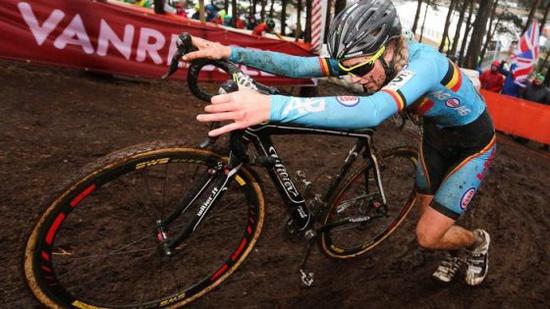- News
- Reviews
- Bikes
- Accessories
- Accessories - misc
- Computer mounts
- Bags
- Bar ends
- Bike bags & cases
- Bottle cages
- Bottles
- Cameras
- Car racks
- Child seats
- Computers
- Glasses
- GPS units
- Helmets
- Lights - front
- Lights - rear
- Lights - sets
- Locks
- Mirrors
- Mudguards
- Racks
- Pumps & CO2 inflators
- Puncture kits
- Reflectives
- Smart watches
- Stands and racks
- Trailers
- Clothing
- Components
- Bar tape & grips
- Bottom brackets
- Brake & gear cables
- Brake & STI levers
- Brake pads & spares
- Brakes
- Cassettes & freewheels
- Chains
- Chainsets & chainrings
- Derailleurs - front
- Derailleurs - rear
- Forks
- Gear levers & shifters
- Groupsets
- Handlebars & extensions
- Headsets
- Hubs
- Inner tubes
- Pedals
- Quick releases & skewers
- Saddles
- Seatposts
- Stems
- Wheels
- Tyres
- Health, fitness and nutrition
- Tools and workshop
- Miscellaneous
- Cross country mountain bikes
- Tubeless valves
- Buyers Guides
- Features
- Forum
- Recommends
- Podcast
 femke wilier.jpg
femke wilier.jpgFrench MP's call to criminalise mechanical doping rejected
A French parliamentarian’s proposal to criminalise mechanical doping in cycling was rejected by the country’s secretary of state for sport at the National Assembly in Paris yesterday. However, he agreed that the government would compile a report on the subject by the end of this year.
Marc Le Fur, a member of the opposition Les Républicains party who represents the Côtes-d'Armor department in Brittany, had proposed bringing in a law that would punish offenders with a fine of up to 15,000 euro and a maximum jail term of seven years.
The proposals were aimed at preserving the ethical values of the sport, reports Le Télégramme, with the issue of mechanical doping the focus of several reports on the French TV show Stade 2 in recent months.
Those reports, which claim among other things that hidden motors were used at races including the Strade Bianche in 2016, came after a hidden motor was found in a bike belonging to Belgian under-23 rider Femke Van Den Driessche at last year’s UCI Cyclo-Cross World Championships.
> Find all our coverage of mechanical doping here
Le Fur’s proposed legislation would have been aimed at those who use one or more “mechanical or technological aides that improve his or her physical performance and falsify the results of competitions he or she is engaged in.”
He said he wanted “to give powers of investigation and inquiry to the police and the Gendarmerie,” and “to make technological fraud a proper crime punishable with a fine of between 3,750 and 150,000 euro and between one and seven years in jail.”
But Jeanine Dubié of the centre-left RRDP group, who chairs a committee on ethics in sport, wondered whether “the public authorities should intervene directly in this area?”
Quoted on the website, Next Inpact, she added that the punishments suggested by Le Fur were disproportionate to the offences and therefore in conflict with constitutional principles.
Both she and secretary of state for sport, Thierry Braillard, maintained that laws regarding the regulation and transparency of sports left it to the governing body [the UCI] and national federations to carry out tests and sanction cases of technological fraud.
> Mechanical doping: No hidden motors found at Tour de France, says UCI
Dubié drew a distinction between doping and mechanical fraud. “If in this area there is no public health aspect, as there is in doping, it is possible that in future large-scale frauds may appear and put at risk the integrity of sport.”
Inviting Le Fur to withdraw his proposed amendment, Braillard agreed that the government would set before parliament by 31 December this year “a report regarding the creation of a crime of mechanical and technological fraud in sport and expanding the powers of the AFLD [France’s national anti-doping agency] to include mechanical and technological fraud.”
Le Fur said: “The amendment wasn’t accepted and I regret that. We’ve missed a chance to get ahead, to anticipate.
“France could have set an example in the issue of the fight against mechanical fraud, as the country does on the subject of doping,” he added.
> British Cycling hoping continued testing will discourage mechanical doping
Latest Comments
- Gkam84 16 min 27 sec ago
That has changed now, as with any "new" sport, it takes time to work out where the boundaries are, who gets to cover what and with which rules. BC...
- Tom_77 1 hour 3 min ago
Typically you will signs like this one.
- chrisonabike 1 hour 9 min ago
However, the highway code revisions now provide more detail and the cyclist overtaking picture has been updated. e.g.:...
- eburtthebike 1 hour 56 min ago
And they were right. It says something about our society that people are prepared to put so much money and effort into opposing something as...
- stonojnr 2 hours 59 min ago
Could make a crass joke about how youre only supposed to flip pancakes today, but i wont...
- Mr Anderson 3 hours 34 min ago
I wouldn't worry too much about the locks being picked, in nearly all cases of bike theft, those Ninja moped gangs, the only things they can pick...
- brooksby 3 hours 53 min ago
They want to pick on The Others in general, rather than a specific group. Immigrants can hate Others just as much as Nigel Farage does.
- don simon fbpe 3 hours 56 min ago
There's no doubting how bad the sport must have been when a banker feels moral enough to criticise...!
Add new comment
1 comments
Lance Armstrong TDF wins
7, days in jail 0*bof*